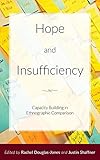Hope and Insufficiency : Capacity Building in Ethnographic Comparison / ed. by Justin Shaffner, Rachel Douglas-Jones.
Material type: TextPublisher: New York ; Oxford : Berghahn Books, [2021]Copyright date: ©2021Description: 1 online resource (180 p.)Content type:
TextPublisher: New York ; Oxford : Berghahn Books, [2021]Copyright date: ©2021Description: 1 online resource (180 p.)Content type: - 9781800730991
- 9781800731011
- 306.3 23
- HN49.C6 H659 2021
- online - DeGruyter
| Item type | Current library | Call number | URL | Status | Notes | Barcode | |
|---|---|---|---|---|---|---|---|
 eBook
eBook
|
Biblioteca "Angelicum" Pont. Univ. S.Tommaso d'Aquino Nuvola online | online - DeGruyter (Browse shelf(Opens below)) | Online access | Not for loan (Accesso limitato) | Accesso per gli utenti autorizzati / Access for authorized users | (dgr)9781800731011 |
Frontmatter -- Contents -- List of illustrations -- Preface . Verbal Sophisms and Problems with Capacity Building -- Introduction . Capacity Building in Ethnographic Comparison -- Chapter 1 . Professionalizing Persons and Foretelling Futures: Capacity Building in Post-Earthquake Haiti -- Chapter 2 . Capacity as Aggregation: Promises, Water and a Form of Collective Care in Northeast Brazil -- Chapter 3 . Building Capacity in Ethical Review: Compliance and Transformation in the Asia-Pacific Region -- Chapter 4 . Corrective Capacities: From Unruly Politics to Democratic Capacitación -- Chapter 5 . Capacity Building as Instrument and Empowerment: Training Health Workers for Community-Based Roles in Ghana -- Chapter 6 . Personal and Professional Encompassment in Organizational Capacity Building: SOS Children’s Villages and Supportive Housing -- Chapter 7 . Community Capacity Building: Transforming Amerindian Sociality in Peruvian Amazonia -- Chapter 8 . ‘Integrating Human to Quality’: Capacity Building across Cambodian Worlds -- Afterword . Measurable Subjectivities and Discoverable Worlds -- Index
restricted access online access with authorization star
http://purl.org/coar/access_right/c_16ec
A process through which skills, knowledge, and resources are expanded, capacity building, remains a tantalizing and pervasive concept throughout the field of anthropology, though it has received little in the way of critical analysis. By exploring the concept’s role in a variety of different settings including government lexicons, religious organizations, environmental campaigns, biomedical training, and fieldwork from around the globe, Hope and Insufficiency seeks to question the histories, assumptions, intentions, and enactments that have led to the ubiquity of capacity building, thereby developing a much-needed critical purchase on its persuasive power.
Mode of access: Internet via World Wide Web.
In English.
Description based on online resource; title from PDF title page (publisher's Web site, viewed 25. Jun 2024)


